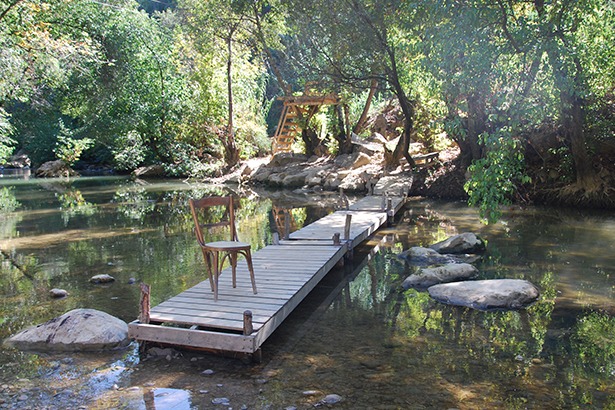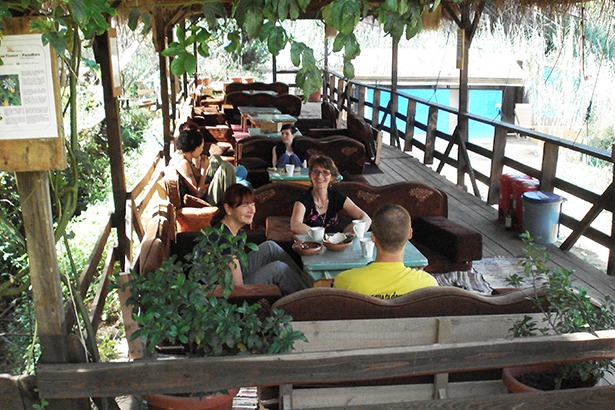“It all started in 2005. We were three friends, Greenpeace activists looking for a safe haven in nature, one that is sustainable. At the same time, my mother had an organic restaurant, Olive, and I wanted to have a farm to supply the restaurant. Several environmentalists’ ideas came together and the end result was Ecovillage, a sustainable farm,” explains Karim Al Khatib, founder and owner of Ecovillage.
Located in the Shouf, the Ecovillage was first a camping place, mainly for Greenpeace activists. Little by little the number of campers grew and the need for some bathrooms became evident. After the bathrooms, the need for electricity revealed itself. “As a sustainable place, we have to create our own electricity, so we made a micro turbine that works on the river water flow,” says Al Khatib. The project continued to gain in popularity and a need for more facilities was becoming more pressing. So, Al Khatib took a loan from Kafalat to continue to develop the project.
Spread over 100,000 m2, Ecovillage is a sustainable village. To be sustainable, a village needs first and foremost to have its own agriculture to feed its inhabitants and visitors. The houses should be built in a sustainable way using natural material such as wood. Using your own water is another condition for sustainability and Ecovillage has its own source of water and facilities to save rainwater. Finally the village should produce its own electricity, which is the case for Ecovillage. “We are probably the only place in Lebanon to have electricity 24/7,” jokes Al Khatib.
Visiting Ecovillage is not only a communion with nature; educational programs for all ages about ecology and sustainability are a major part of the visit. The young can learn about the food chain, and adults can learn about the medical herbs that grow all over the region. “We teach visitors of all ages about the ecosystem and the importance of sustainability. Who knows, maybe that young camper will grow up to become an architect and we might have opened their eyes on a new way of thinking.”
Aside from the educational aspect, the village is a place where you can enjoy swimming in the river, walks in nature, rock climbing and participate in zip wire activities. For the less adventurous planting and pottery painting activities are also available. The restaurant uses local produce to offer visitors traditional vegetarian dishes.
Ecovillage is a wonderful venue to spend some quality time with family, unwind with friends, get rid of stress and learn about the environment and the local traditions. It is also an ideal venue for companies with a conscience to hold conferences, workshops and team building activities.
The next big thing for Ecovillage is to be a zero waste venue. “Although we sort the waste, we do not re-use it and that’s the next step. We will be re-using all of the glass, metal and wood we collect in many ways in an effort to become more industrial,” reveals Al Khatib.
“And now that we have a new born, [Karim is now a father] we are working on making the village baby friendly and are creating some stroller accessible paths around the village.”
Sustainable weddings
Weddings are a major event for the Lebanese society, but, also a great source of waste. In the line of sustainable philosophy, Ecovillage has introduced the sustainable wedding concept and created the “La Maison des Merveilles” venue. Here you can have a wedding that is up to Lebanese standards without being wasteful. In the beautiful natural surroundings of the Ecovillage, the wedding will be catered using produce grown on the premises, as well as meat from the animals bred within the village. Electricity, music and lighting are available and decorations are mostly wild flowers. The wedding is sure to compete with any traditional Lebanese wedding with a plus: it will surely cost far less!
Ecovillage is an ecotourism educational project situated in the Dmit valley of the Shouf mountains 22km (40 minutes) away from downtown Beirut. The land extends on 130,000 m2 surrounded by pine forests and bordered by the Safa River. Its aim is to provide its 10,000 yearly visitors education about its environment and sustainable living. Ecovillage can host 60 people in cottages and tree houses and has a restaurant that serves vegetarian food.
Karim El Khatib:
- Tel: +961 3 381 733 / +961 3 211 463
ecovillagelebanon.com
Article edited on November 15, 2021
Loading


